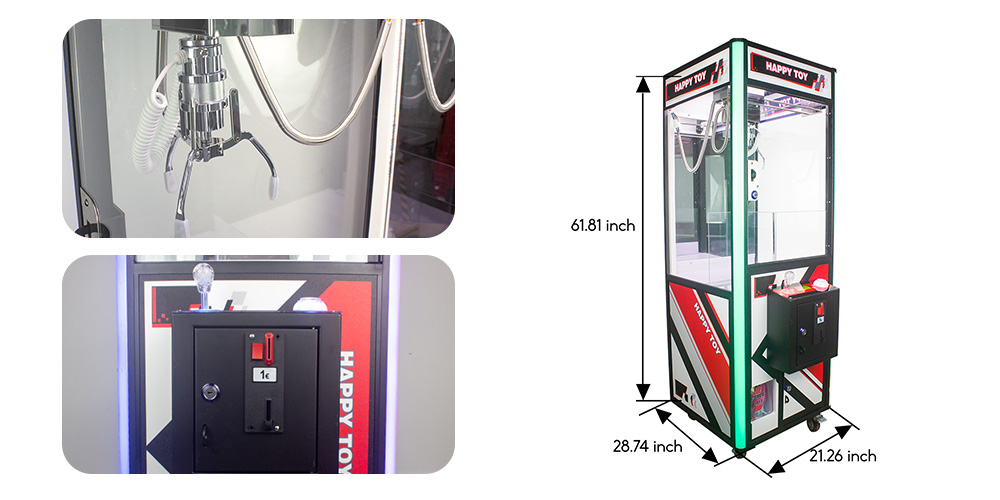Yes, you typically need a license to place claw machines in the U.S., but requirements vary by state and city. Some areas require an arcade license or a permit specific to amusement devices. Fees can range from $50 to $250 annually per machine. Additionally, certain states may impose regulations on machine settings to ensure fairness. It’s important to check with your local government or licensing department for specific rules in your area. Compliance with these regulations helps avoid penalties and ensures that your business operates legally and smoothly.
Table of Contents
ToggleIndustry Scope of Claw Machines
The USA trade body IBISWorld estimates the U.S. amusement device industry to be worth around $2.2 billion in 2023, with claw machines and arcade games making up a large part of this market. Purchases of claw machine operations, which include shopping malls, amusement parks, and cinemas, have great commercial potential.
Arcade amusement game laws and rules differ for every state, with categories based on each state’s specific regulations and definitions of amusement devices. Some classify claw machines as games of skill, while others include them with other games. This categorization determines the licenses and regulations that apply.

Required Licenses and Permits
1. Business License
The first thing you will need to do in any state or city is apply for a basic business license as an operator of claw machines. This is necessary for all lawful business.
-
Costs: Business license fees would range from $50 to about $500, depending on state and city regulations. The fee may be altered in certain regions by the number of units or estimated sales.
-
Apply Time: Processing time is 1 to 4 weeks generally. A few states have online application systems that make things even simpler.
2. Amusement Device License
In just about every state, you need to obtain an amusement device license in order to run claw machines legally. The licensing requirements may also vary depending on the value of prizes, number, and type of machines.
-
Fees: The fees for an amusement device license can cost between $50 and $200 per machine annually. You are charged for each machine that you run, if you have more than one.
-
Annual-Inspection Requirement: Some states mandate regular safety checks that may be practical on the utility side of things, if not a bit hands-on. The fees for inspection usually vary between $25 and several hundred dollars per machine.
3. Sales Tax Permit
You may need to get a sales tax permit and be required by the state to collect, report, and pay all fees. They must also account for any claw machine operator that is using coin/cash or electronic payment.
-
Sales Tax Rates: Sales tax rates depend on the U.S. state. Generally speaking, they range between 4% and 10%. In some areas of California, the sales tax rate is as high as 10%, while states like New Hampshire do not have a sales tax.
-
Application Process: State tax authority, 2–6 weeks. There are also online systems available in many states.
4. Local Ordinances and Specific Requirements
Some cities or counties enforce permits and regulations on claw machine operations in addition to the state-level ones. Some might have restrictions on the number of machines that can be operating or when they are allowed to operate.
-
Maximum number of machines allowed per location: Some cities may put a cap on the number of machines in larger towns that are given permission to install. For example, only 10 machines are allowed, while smaller townships or rural counties may have no fixed limits.
-
Hours of Operations: Some areas limit the use of entertainment devices to certain hours (e.g., 9 AM–9 PM) so as not to be disruptive to those that live nearby.

Special Considerations
Regular Inspections and Fairness Requirements
Claw machine devices are more strictly regulated in certain states, including California and New York. In these states, operators are required to periodically inspect mechanical equipment to guarantee fairness and operational safety. Generally, 1–2 inspections per year are necessary and may come with extra fees. This helps to ensure that the machines are not giving away prizes far in excess of reasonable bounds, with several states enforcing a maximum prize value (rarely—if ever exceeding $500) on these sorts of machines to ensure they remain transparent.
Special Regulations for Commercial and Public Spaces
Within some commercial areas and heavily used public places, there are a variety of specific regulations that operators may have to conform with. These areas may limit the number of machines, or where they are located and when they can be used, in order to maintain public decorum. Each location may be restricted to about 5–10 machines. Furthermore, claw machines need to be situated in a designated section so as not to block emergency exits or main entrances. Operating hours are likely to be limited as well, especially at night or on holidays, when machines may be restricted from 9 AM to 9 PM, reducing the environmental impact.




